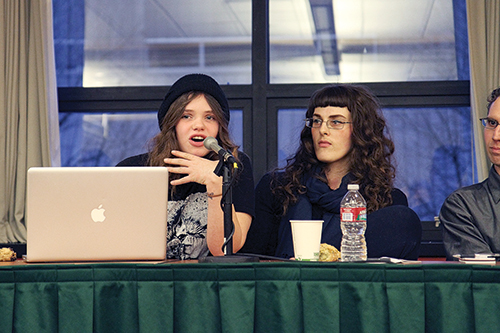
Are there more than just two possibilities—armed or unarmed—for the future of Portland State’s Campus Public Safety Office?
Around 100 Portland State students, faculty and community members attended a panel discussion Tuesday to explore other possibilities in the campus security discussion.
The event was organized by PSU’s Student Action Coalition and the Students for Unity. All members of the panel opposed arming CPSO.
The issue is more complex than the administration is making it out to be, said Chelsea Harris, a graduate student at PSU and a member of Students for Unity who helped plan the event.
“There are other ways of thinking of the issue than just one police force [CPSO] or the other [Portland Police Bureau],” Harris said. “It also brings up a lot of bigger societal issues that I think students are willing to engage with.”
The panel included Genevieve Goffman, an activist with local groups Pink Tape Collective and Blazing Arrow Organization; Meghan Keener, an activist with the transformative justice group Praxiss; Kristian Williams, local author of Our Enemies in Blue: Police and Power in America; and Dr. Aimee Clott, a PSU professor of conflict resolution.
CPSO Chief Phil Zerzan said he encourages community dialogue on the topic.
“We welcome an opportunity to participate in it,” Zerzan said.
While the panelists answered questions about what the campus might look like if CPSO were armed and why alternative ideas need to be considered, the group was unable to reach a consensus on a specific approach they could collectively endorse.
The discussion started with the panel answering questions posed by members of Students for Unity, covering topics like why there is a need for community alternatives to police; how having a police department could exacerbate racism, sexism and classism on campus; and how PSU’s community could best respond to reports of sexual assaults on campus.
One topic, transformative justice, was covered at length. Transformative justice is a strategy for responding to conflicts that takes into account not only the actual crime but also its causes, and tries to treat an offense as a transformative opportunity for victims, offenders and all other members of the affected community.
According to the panel, transformative justice could help find the roots of these societal issues.
“It’s about this culture that makes these [crimes] possible over and over
again…transformative justice is about getting to that root and working [to end it],” Keener said.
People in our society have a propensity toward violence, Clott said.
“We live in a culture that causes fear and anxiety every day…That experience with culture [is what] gives [people an] entitlement to be violent,” she said.
“[Transformative justice] has to do with seeing sexual assault or violent crime as everyone’s problem. Transformative justice is getting rid of whatever it is that causes us to harm each other in that way,” Goffman said.
As far as implementing transformative justice at PSU, Clott said there is no specific way to accomplish it.
“We have [an] opportunity to create this, and we don’t know what it looks like, but we should at least try,” Clott said.
A timely question in the second hour of the event came from an audience member who wanted to know how PSU would respond to an active-shooter incident without police on campus, given recent school violence around the country and the shooting at Clackamas Town Center in December.
The panel could only answer this question with more questions.
“Is having a shootout on campus…preferred?” Keener asked.
“Would I feel safer if there was a cop on campus with a gun who [might] shoot someone just because they look dangerous?” Goffman asked.
“There are things police do well and things they do badly. The things they do badly include responding to reports of crime and sexual assault. The things they do well are hassling poor people and…shooting people needlessly. I think we need something that’s fundamentally different than a police force,” Williams said.
“The police stop and search and…kill. One way to look at that is, it’s their fucking job. Preserving inequality is what they’re there for,” he added.
Keener agreed that something other than a police force is needed.
“Once you have this police force, it’s not going to be your choice anymore, and that’s [something] that concerns me. I’m having trouble coming up with a relevant example for this because I think it’s ridiculous to have police on campus,” she said.
Clott would like to see the roots of the societal issues causing crime addressed, instead of “putting a Band-Aid” on them with a police force.
“When we look at these issues we tend to pathologize people…we need to destigmatize [the sensationalism around events of trauma and violence] and look at the bigger picture,” she said. “I think what we’re looking at is the further institutionalization of inequality.”
Keener said the focus needs to be on change, and not on arming police.
“We need to put work into changing our culture and changing our responses to things,” she said.
Williams ended the discussion by acknowledging that the panel didn’t have answers to all the questions posed to them.
“What comes out of this isn’t a specific [equation] of what has to be done…All kinds of things are broken, so [you can] start anywhere.”
Editors note: This story has been edited re: the individuals invited to be on the panel.

